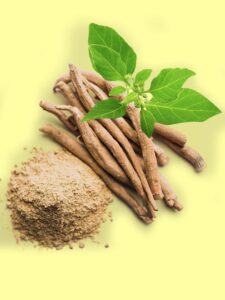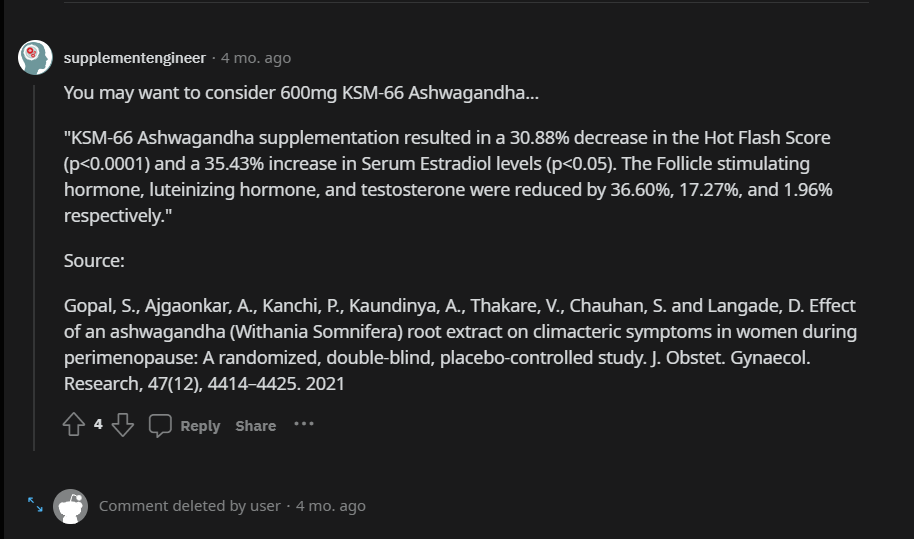Table of Contents
ToggleAre you looking for ways to manage the symptoms of perimenopause? Are you hoping to regain some balance and mental clarity in your life? If so, I understand exactly how you feel. After entering perimenopause myself, I was feeling overwhelmed by hormonal shifts, mood swings, and fatigue. Thankfully, after plenty of research and trying various supplements, I stumbled upon ashwagandha – an ancient Ayurvedic herb with profound health benefits.
In this article we’ll discuss what ashwagandha is and why it’s become popular for treating multiple concerns related to menopause. You’ll learn about its effects on hormones levels as well as stress-related issues such as anxiety or insomnia. Plus we’ll look at how ashwagandha can actually help strengthen bones and improve muscle mass in post-menopausal women too! By the end of this article you will have all the information you need to decide if ashwagandha is right for helping ease your perimenopause symptoms. So let’s dive into one of nature’s most powerful herbs!
What is Ashwagandha?

Ashwagandha is a fascinating herb that has garnered attention for its potential health benefits. Not only does it have a cool-sounding name, but it also has a rich history in traditional medicine. Withania somnifera, as it’s scientifically known, has been used in Ayurvedic practices for centuries.
What sets ashwagandha apart from other herbs is its adaptogenic properties. This means that it helps the body cope with stress and maintain equilibrium. In today’s fast-paced world, where stress seems to be an unavoidable part of life, finding natural ways to manage it is crucial.
Ashwagandha works by supporting the adrenal glands, which are responsible for producing hormones like cortisol that help regulate stress responses. By modulating these hormone levels, ashwagandha can promote balance and provide relief from anxiety and fatigue.
But the benefits don’t stop there! Ashwagandha has also been linked to improved cognitive function and memory retention. It contains compounds called withanolides that possess anti-inflammatory and antioxidant properties – two factors essential for brain health.
- Reduced anxiety
- Better sleep quality
- Increase in energy levels
- Enhanced physical performance
- Boosted immune system
- Hormonal balance support
- All in all, Ashwagandha is an incredible herb with numerous potential benefits for both mind and body alike!
We have covered an extensive guide on Ashwagandha which includes ashwagandha and birth control. Further to better understand the herb and its various uses, we have covered topics like ashwagandha and eczema which you might be interested in.
Also, check out our recent posts: ashwagandha and zinc together
The Benefits of Ashwagandha for Perimenopause
Perimenopausal
by u/Possible_Still_1562 in Supplements
Ashwagandha, a herb native to India and North Africa, has become quite the buzzword among women dealing with the roller coaster ride that is perimenopause. And for good reason! This ancient remedy holds promise when it comes to restoring hormonal balance in our frazzled bodies.
Picture this: you’re going about your day when suddenly, without warning, a scorching hot flash hits hard. Your face turns red as if you just ran a marathon and beads of sweat trickle down your forehead like tiny soldiers on a mission. It’s no wonder so many women are turning to ashwagandha for relief from these fiery episodes.
But ashwagandha doesn’t stop at cooling us down; it also offers respite from those dreaded night sweats that leave us tossing and turning in our sleepless bedsheets. By gently regulating our hormones, this herbal superhero helps restore tranquility during those restless nights.
Mood swings? Oh boy, don’t even get me started! One minute we’re laughing hysterically at a sitcom rerun on TV and the next minute we’re bawling over an emotional commercial featuring puppies. Ashwagandha comes to the rescue once again by promoting emotional balance and fighting off those pesky mood swings that threaten to ruin our day – or make it incredibly entertaining for everyone around!
You Might Like: https://realgoodgummies.com/how-to-cycle-ashwagandha
Managing Hormone Levels with Ashwagandha

This ancient herb, ashwagandha, is like a magical elixir for women going through that wild rollercoaster ride called perimenopause. You know, that phase right before menopause when your hormones decide to play a game of hide-and-seek? Yeah, it can be quite an adventure.
But fear not! Ashwagandha comes to the rescue by swooping in and helping get those hormones back in line. It’s like having a personal hormone whisperer. How does it work its magic? Well, this herb has some serious powers over our endocrine system – you know, the one responsible for all things hormonal.
Ashwagandha acts as a gentle conductor in this hormone symphony by promoting balance between estrogen and progesterone levels. And let me tell you, achieving that harmony is no easy feat during perimenopause. Estrogen likes to go on these crazy joyrides while progesterone plays hard to get.
But with ashwagandha on your side, those hormones start dancing together again – more like Fred Astaire and Ginger Rogers than two awkward teenagers at their first school dance. This herbal maestro helps keep estrogen from stealing the show and gives progesterone the confidence boost it needs.
So ladies, if you’re looking for some natural support during perimenopause (because who wants those wacky mood swings?), consider giving Ashwagandha a try. It might just be the key to finding hormonal bliss amidst all the chaos.
You Might Like: https://realgoodgummies.com/ashwagandha-and-maca-root
Addressing Stress-Related Concerns
Perimenopause, that transitional phase when a woman’s body prepares for menopause, can bring about a whirlwind of changes. Hormones go on a wild rollercoaster ride, and along with it comes increased stress levels. It’s like your body’s way of saying, “Hey lady, let me throw in some anxiety and insomnia to spice things up!”
But fear not! There might just be a natural remedy that could help ease those pesky symptoms – Ashwagandha. Now don’t be fooled by the name; it may sound fancy, but it’s actually an ancient herb used in Ayurvedic medicine for centuries.
Ashwagandha has been found to have calming effects on the nervous system. Imagine it as a gentle conductor orchestrating your frazzled nerves into harmonious melodies. By taming the nervous system, this wonder herb may potentially reduce anxiety and promote better sleep.
Now I know what you’re thinking – how does this magic happen? Well, Ashwagandha contains compounds called adaptogens that help regulate the body’s response to stressors. These adaptogens work tirelessly behind the scenes to restore balance amidst the chaos.
So if perimenopause has turned your world upside down with its sneaky stress-induced side effects like anxiety and insomnia, consider giving Ashwagandha a try. Just remember to consult with your healthcare provider before adding any new supplements to your routine.
In conclusion
– Perimenopause can lead to increased stress levels
– Ashwagandha is an herbal remedy known for its calming effects
– It may potentially reduce symptoms like anxiety and insomnia
– Adaptogens in Ashwagandha help regulate stress response
– Consult with a healthcare provider before trying any new supplements
You Might Like: https://realgoodgummies.com/ashwagandha-withdrawal-things-you-must-know
The Impact of Ashwagandha on Bone Health
As women journey through the inevitable process of aging, they may encounter a formidable foe known as osteoporosis. This villain sneaks up on them, stealthily chipping away at their bone density. It’s like a tiny army of termites weakening the foundation of a once sturdy house.
Luckily, there might be hope for these courageous ladies battling menopause and its unwelcome side effects. Enter ashwagandha, an herbal remedy that could potentially come to their rescue. Numerous studies have suggested that this ancient herb possesses remarkable abilities to improve bone strength and reduce the risk of fractures in postmenopausal women.
Imagine Ashwagandha as a superhero cape wrapped around weakened bones. Its potent properties work by stimulating the formation of new bone cells while inhibiting those pesky cells responsible for breaking down bones. With each dose, it diligently fights off osteoclasts – those notorious troublemakers who destroy our precious skeletal system bit by bit.
- Ashwagandha not only fills in cracks but restores lost strength
- Reducing fracture risks one powerful compound at a time
In conclusion, dear readers, if you or your loved ones are navigating the treacherous waters of menopause and are concerned about brittle bones betraying you in your golden years – fear not! Ashwagandha may just be your secret weapon against osteoporosis; its potential to enhance bone strength and reduce fracture risks is truly extraordinary.
You Might Like: https://realgoodgummies.com/ashwagandha-gummies-for-sex
Improving Muscle Mass with Ashwangdha
As we age, our bodies undergo various changes, and for women entering menopause, maintaining muscle mass can become quite a challenge. However, recent studies have shown promising results when it comes to combating this issue. One exciting finding suggests that applying ashwagandha can not only increase muscle mass but also strengthen bones.
Ashwagandha is an ancient herb that has been used in traditional Ayurvedic medicine for centuries. It is known for its numerous health benefits and its ability to promote overall well-being. But what makes ashwagandha particularly intriguing in relation to menopause is its potential impact on muscle mass.
Research conducted on postmenopausal women found that regular application of ashwagandha oil resulted in increased muscle strength and improved body composition. This means that not only were the participants able to build more muscle, but they also experienced a reduction in fat mass. These findings suggest that incorporating ashwagandha into a daily routine may help counteract the natural decline of muscle mass associated with menopause.
In addition to promoting muscle growth, ashwagandha has also been linked to strengthening bones – another concern during menopause due to the decrease in estrogen levels. Studies have demonstrated that taking ashwagandha supplements regularly can enhance bone mineral density and reduce the risk of osteoporosis-associated fractures.
In conclusion, while maintaining muscle mass after menopause may be challenging, incorporating ashwagandha into your routine could potentially make a significant difference by increasing both your strength and bone density!
Considerations Before Using Ashwangdha
When it comes to managing perimenopause symptoms, many women are turning to natural remedies like ashwagandha. This herb, also known as Indian ginseng, has been used for centuries in Ayurvedic medicine for its ability to support the body during times of stress and hormonal imbalance. But before jumping on the ashwagandha bandwagon, it’s crucial to do your due diligence.
One of the first things you should do is consult with a healthcare professional. They can help determine if ashwagandha is safe for you based on your specific medical history and current medications. Some medications may interact negatively with ashwagandha, leading to potential side effects or reduced effectiveness of either the medication or the herb itself.
Additionally, certain medical conditions may pose a risk when combined with ashwagandha supplementation. Conditions such as autoimmune diseases, thyroid disorders, and diabetes can be influenced by hormonal changes that may be affected by ashwagandha. Your healthcare provider will be able to assess whether incorporating this herb into your routine could potentially exacerbate any existing health issues.
Taking these precautions ensures that you’re making informed decisions about your health and well-being. While natural remedies like ashwagandha can offer great benefits for managing perimenopause symptoms, it’s always wise to seek professional guidance before adding anything new to your routine. So take care of yourself and consult with a healthcare professional today!
FAQ
1. What is perimenopause and how does it affect women’s well-being?
Perimenopause refers to the transitional phase before menopause when a woman’s hormone levels start to decline. It can cause various symptoms such as hot flashes, mood swings, sleep disturbances, and decreased libido.
2. Can ashwagandha help alleviate the symptoms of perimenopause?
Yes, ashwagandha has been found to have adaptogenic properties that may help regulate hormones and reduce stress-related symptoms associated with perimenopause.
3. How do I take ashwagandha for managing perimenopausal symptoms?
Ashwagandha supplements are available in various forms such as capsules, powders, or tinctures. It is recommended to follow the dosage instructions provided by the manufacturer or consult a healthcare professional for personalized guidance.
4. Are there any potential side effects of using ashwagandha during perimenopause?
While ashwagandha is generally considered safe for most individuals, some people may experience mild side effects like digestive upset or drowsiness. It is important to start with a low dosage and monitor your body’s response.
5. Can I use ashwagandha alongside other medications or treatments for perimenopausal symptoms?
It is advisable to consult with your healthcare provider before incorporating any new supplement into your routine while using other medications or treatments. They can provide personalized advice based on your specific health conditions and medication interactions.
Dr. Susan Francis is a passionate medical professional with over 4.5 years of experience in the field. She received her medical degree from the University of Michigan and completed her residency at the Mayo Clinic.
In addition to her clinical work, Dr. Francis has a strong interest in medical writing and editing. She has edited numerous articles for medical journals and is a regular contributor to several healthcare publications.
Dr. Francis is committed to promoting accurate and accessible medical information to the public. In her free time, she enjoys staying up to date on the latest medical research and volunteering at local healthcare clinics.
- October 3, 2023
- October 3, 2023









